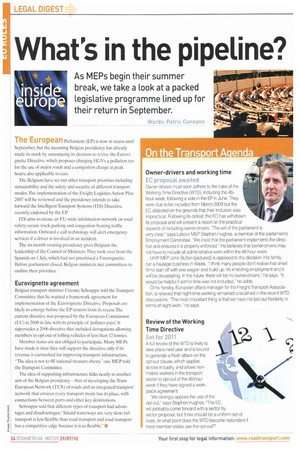What's in the pipeline?
Page 24

If you've noticed an error in this article please click here to report it so we can fix it.
As MEPs begin their summer break, we take a look at a packed legislative programme lined up for their return in September.
Words: Patric Cunnane
The European Parliament (EP) is now in recess until September, but the incoming Belgian presidency has already made its mark by announcing its decision to revive the Eurovignette Directive, which proposes charging HGVs a pollution tax for the use of major roads and a congestion charge at peak hours, also applicable to cars
The Belgians have set out other transport priorities including sustainability and the safety and security of different transport modes. The implementation of the Freight Logistics Action Plan 2007 will he reviewed and the presidency intends to take forward the Intelligent Transport Systems (ITS) Directive, recently endorsed by the E:P.
ITS aims to create an EU-wide information network on road safety: secure truck parking and congestion-heating traffic information. Onboard e-call technology will alert emergency services if a driver is involved in an accident.
The six-month rotating presidency gives Belgium the leadership of the Council of Ministers They took over from the Spanish on 1 July, which had not prioritised a Eurovignette. Before parliament closed, Belgian ministers met committees to outline their priorities,
Eurovignette agreement
Belgian transport minister Etienne Schouppe told the Transport Committee that he wanted a framework agreement for implementation of the Eurovignette Directive. Proposals are likely to emerge before the EP returns from its recess. The current directive was proposed by the European Commission (EC) in 2008 in line with its principle of 'polluter pays'. It supersedes a 2006 directive that included derogations allowing members to opt out of tolling vehicles of less than 12 tonnes.
Member states are not obliged to participate. Many MEPs have made it clear they will support the directive only if its revenue is earmarked for improving transport infrastructure. "The idea is not to fill national treasure chests,one MEP told the Transport Committee.
The idea of supporting infrastructure links neatly to another aim of the Belgian presidency that of developing the Trans European Network (TEN) of roads and an integrated transport network that ensures every transport mode has its place, with connections between ports and other key destinations.
Schouppe said that different types of transport had advantages and disadvantages "Inland waterways are very slow: rail transport is less flexible than road transport and road transport has a competitive edge because it is so flexible.-•




























































































































